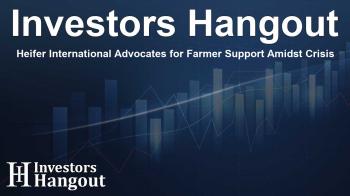Heifer International Advocates for Farmer Support Amidst Crisis

Heifer International Advocates for Farmer Support Amid Climate Crisis
Heifer International is calling for urgent action to assist smallholder farmers affected by the extreme weather patterns brought on by climate change. The recent impact of Tropical Depression Sara highlights the vulnerability of agricultural communities across Central America, prompting the organization to raise awareness about the need for immediate resilience-building initiatives.
The Impact of Tropical Depression Sara
Tropical Depression Sara recently brought heavy rainfall to several countries, including significant flooding in rural areas. Over 123,000 individuals were impacted, with reports of severe damages to infrastructure and agriculture. The storm resulted in devastating losses, flooding rivers, and increasing the risks of life-threatening mudslides in many regions.
Oscar Castañeda, senior vice president of Heifer's Americas programs, expressed concern over the situation, stating that the storm's effects on rural populations emphasize the pressing need for bold climate action. He called for discussions at the upcoming COP29 to focus on adaptation strategies for rural farmers who play a crucial role in global food production and local economies.
The Vulnerability of Smallholder Farmers
Smallholder farmers, who are responsible for producing up to 80% of the food in low- and middle-income countries, are becoming increasingly vulnerable to climate-related crises. Many lack adequate access to financial resources, making them particularly susceptible to economic shocks caused by disasters such as Tropical Depression Sara.
This storm follows a prolonged drought that has already caused significant crop failures in Central America, leading to rising hunger and poverty rates among rural communities. With livelihoods heavily dependent on fragile ecosystems, the need for support and adaptation measures has never been more critical.
Heifer's Response and Long-Term Commitment
In response to the devastation caused by Tropical Depression Sara, Heifer International is collaborating with local partners to assess the damage and deliver immediate relief to affected families. Especially in Honduras, where thousands of homes and farming communities were rendered inaccessible, Heifer's efforts are crucial.
Reported losses include significant damage to beehives, corn, beans, and livestock, disrupting the livelihoods of many farmers. Beyond providing immediate aid, Heifer is dedicated to implementing long-term resilience-building measures. These initiatives include:
Sustainable Livestock Practices
In Honduras, Heifer is equipping dairy farmers with innovative techniques to enhance biodiversity and soil management. The introduction of climate-resilient fodder crops alongside sustainable grazing practices helps farmers not only improve milk production but also maintain healthier ecosystems.
Advancing Regenerative Agriculture
In Guatemala, Heifer supports spice farmers through the Green Business Belt program, encouraging a shift toward agroforestry. This transition has not only increased incomes for farmers but also contributed positively to soil health and carbon sequestration efforts.
About Heifer International
Heifer International has been instrumental in the fight against hunger and poverty since 1944, positively impacting the lives of over 52 million people worldwide through sustainable development initiatives. Currently, Heifer operates in 19 countries across Africa, Asia, and the Americas, including the United States, facilitating local economic development and helping farmers secure living incomes.
Frequently Asked Questions
What is the main focus of Heifer International's recent action?
Heifer International is urging immediate support for smallholder farmers to build resilience against climate impacts, especially after Tropical Depression Sara's damaging effects.
How did Tropical Depression Sara affect rural communities?
The storm caused significant flooding, impacting over 123,000 people, destroying homes, and compromising agricultural outputs, especially in Honduras and Guatemala.
Why are smallholder farmers particularly vulnerable during climate crises?
Many smallholder farmers lack financial safety nets and are heavily reliant on fragile ecosystems, making them susceptible to economic shocks from disasters.
What long-term initiatives is Heifer implementing in response to the crisis?
Heifer is focused on sustainable livestock practices and regenerative agriculture to help farmers adapt and thrive amidst climate challenges.
How can individuals learn more about Heifer International's efforts?
For additional information on Heifer's programs and initiatives worldwide, visit their official website.
About Investors Hangout
Investors Hangout is a leading online stock forum for financial discussion and learning, offering a wide range of free tools and resources. It draws in traders of all levels, who exchange market knowledge, investigate trading tactics, and keep an eye on industry developments in real time. Featuring financial articles, stock message boards, quotes, charts, company profiles, and live news updates. Through cooperative learning and a wealth of informational resources, it helps users from novices creating their first portfolios to experts honing their techniques. Join Investors Hangout today: https://investorshangout.com/
Disclaimer: The content of this article is solely for general informational purposes only; it does not represent legal, financial, or investment advice. Investors Hangout does not offer financial advice; the author is not a licensed financial advisor. Consult a qualified advisor before making any financial or investment decisions based on this article. The author's interpretation of publicly available data shapes the opinions presented here; as a result, they should not be taken as advice to purchase, sell, or hold any securities mentioned or any other investments. The author does not guarantee the accuracy, completeness, or timeliness of any material, providing it "as is." Information and market conditions may change; past performance is not indicative of future outcomes. If any of the material offered here is inaccurate, please contact us for corrections.
